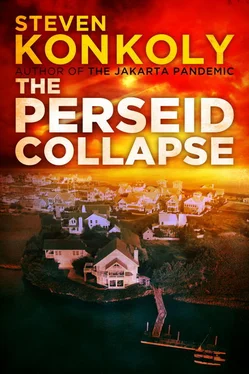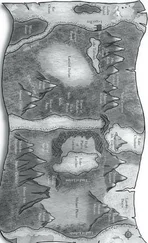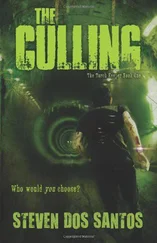Alex started his mental inventory before Ed and Charlie had disappeared down the driveway. He’d have to adjust for their updated transportation situation, which would simplify the process but force them to make some painful decisions. They would have to leave most of their gear and supplies behind, opting for lighter, more practical immediate survival load-outs suitable for bicycle or foot mobile operations. The Fletchers’ bug-out plan had always been relatively simple, since they had never anticipated travelling any farther than Alex’s parents’ farm roughly thirty-five miles away. The comprehensive escape plan accounted for the use of two vehicles, but could be scaled down to accommodate any level of timeframe and transit mode. In this case, they would have to reconfigure for a bicycle trip and a forty-eight-hour, low-intensity urban combat mission. Two vastly different operations, with distinctly different objectives.
The bicycle group’s individual load-out would be designed for thirty-six hours, with a focus on additional hydration. He would recommend that each person carry ten liters of water, in a combination of three-liter CamelBaks and additional stainless-steel bottles. Four MREs, a dozen energy bars, a flashlight or headlamp, one change of clothing and footwear stuffed in a waterproof bag, one emergency blanket, and a serrated folding knife would round out the mandatory individual load. Within the group, they would have to carry a first aid kit, road maps, enough camping tents to accommodate everyone, binoculars to scout the road ahead, toilet paper, a satellite phone, and of course—firearms.
His vision for the Boston mission involved a twenty-four-hour tactical kit, for operations in and around the city, and a forty-eight-hour sustainability pack in case they were forced to abandon the vehicle at any point during their journey. They could carry extra gear and “luxuries” in the Jeep, but Alex would configure their essential equipment for immediate evacuation. If something went severely wrong on the road, he didn’t need Charlie and Ed fumbling around the SUV, trying to collect their shit. Vehicles had a tendency to attract projectiles in that kind of situation.
He’d instituted a “five second” rule for his Amphibious Assault Vehicle Company in Iraq. If one of his vehicle commanders gave the order to abandon their AAV, each marine had their essential gear stashed where they could “grab and go” within five seconds. The rule had saved numerous lives on the road to Baghdad. The road to Boston wouldn’t be lined with rocket-propelled grenades, machine-gun teams and improvised explosive devices, but it had the potential to be just as deadly. Their Jeep would undoubtedly attract the wrong kind of attention, topping the list of high-value targets wherever they drove.
His group would be heavily armed, but a gunfight before reaching their destination would most likely represent the loss of their vehicle. A numerically superior force would push them away from the SUV. They might escape with their lives, but they’d lose the Jeep. A smaller group could irreparably damage the car, leaving them in the same situation. They would seek the path of least resistance to the outskirts of Boston, even if it meant adding significant mileage and time to their trip. Detect and avoid . The complete opposite of his mission in Iraq.
He stepped into the mudroom and moved the stools into the bathroom shower stall, glancing at the sink, which was filled with dark brown silt. The sink burped, splattering a small bubble of silt onto the walls. The sewer system was useless at this point . He wondered what would happen if they tried to flush the toilets .
“Kate?” he yelled.
“Yeah?” she replied from the kitchen.
“Is the sink backed up in there?”
“Sort of. It’s filled with mud, but I’ve managed to clean some of it out. It’s draining really slowly.”
“How about upstairs?”
“Everything looked normal up there, like nothing happened,” she said.
Alex leaned out of the bathroom door. “I think we should restrict our use of the bathrooms to the upstairs, and stop using the toilets at the first sign of a backup. I’m afraid to flush the one down here. The last thing we need is raw sewage in the house.”
“I’ll let the kids know; then I’m going to start on lunch. I think we can skip the water hoarding. Between the garage and closet, we’ll be leaving most of it behind when we head out,” she said.
“Yeah, I agree. Sounds like they finished filling the tubs, anyway. That should be enough, just in case something keeps us from leaving.”
“So Ed’s Jeep works?” she added.
“Apparently. It’ll get us to Boston a hell of a lot quicker than biking down,” said Alex.
“Why don’t we ferry the rest of the group back and forth to Limerick? I don’t know about leading a group of nine women and kids on bikes through this crap,” said Kate.
“Once you get a mile or two inland, you’ll be on dry pavement,” said Alex.
“Easy for you to say, cruising by in a four-wheel-drive vehicle. You could at least get us to Route 11.”
“I don’t think that would be a good idea, Kate. It’ll take at least two round trips if we do it that way. That Jeep will have a big bull’s-eye on it wherever it goes. We can’t have it repeatedly cruising back and forth through Scarborough, or any towns, for that matter. We especially can’t bring it back here. The neighbors will be all over us. Once that Jeep drives out of the garage, it can’t come back. Which reminds me, before we leave, we have to sanitize the house of any information that could lead people out to Limerick, or we’ll have a refugee camp on our hands.”
“Could you turn any of these people away if they showed up out there?” Kate asked.
“No, but I don’t plan on making it easy for them to find us.”
Kate flashed him an annoyed look, which he could live with for now. He crossed the sludge-covered floor to the small study that Kate and Alex used as a temporary refuge from the noise level created by teenagers and the ever-blaring television in the family room. The floor-to-ceiling bookshelf had been emptied of its contents, with the exception of the top shelf, which had stubbornly held onto several overturned picture frames. Hundreds of books lay in various states of damage at the base of the bookshelf, forming a two-foot high, unstable pile of soggy pulp and wilted hardcovers. The brown leather chairs were covered in half-dried filth, one of them home to a mangled, brushed silver lamp and one half of the window’s plantation shutters. He remembered seeing the other white shutter under the bench in the mudroom. He opened the study closet to take his first real inventory. In all likelihood, they wouldn’t need much more than what he could salvage from the closet—aside from the guns, ammunition and a few select gadgets. Actually, this closet was just the “tip of the iceberg.”
The right side of the closet housed built-in shelves that held a dozen 2.5-gallon jugs of spring water, two 120-serving “grab and go” buckets of freeze-dried vegetables and a black nylon duffel bag filled with twenty military-grade MREs. This stockpile represented more than enough food and water to satisfy the needs of his family during tomorrow’s exodus. He knew that Charlie and Ed kept similar stockpiles on their first floors, so there would be no need to waste time retrieving additional food or water from the basement. Two dark green, metal .50 caliber ammunition cans sat on the top shelf, below the wall’s high-water mark. He pulled both of them down and set them on the antique cherry wood desk against the interior wall of the house.
He opened the canister marked “EG” to confirm that it had not leaked. From what he could tell by visual examination, the waterproof seal had held as advertised, sparing the electronics gear from any water damage. The converted storage can held two Iridium satellite phones, a handheld GPS plotter, a pair of two-way VHF handheld radios, a handheld radio scanner and three thirty-round .223 AR magazines. He reached deep into the canister to feel for water or moisture. Thankfully, it was bone dry . He pocketed the full AR magazines before closing the canister.
Читать дальше












